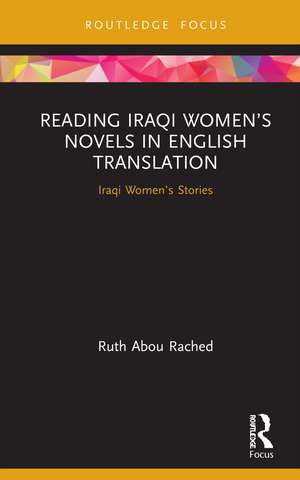Reading Iraqi Women’s Novels in English Translation: Iraqi Women’s Stories: Focus on Global Gender and Sexuality
Autor Ruth Abou Racheden Limba Engleză Hardback – 29 oct 2020
The writers in focus are Samira Al-Mana, Daizy Al-Amir, Inaam Kachachi, Betool Khedairi, Alia Mamdouh and Hadiya Hussein, whose novels include themes of exile, war, occupation, class, rurality and storytelling as cultural survival. Using perspectives of feminist translation to examine how Iraqi women’s story-making has been mediated in English translation across differing times and locations, this book is the first to explore how Iraqi women’s literature calls for new theoretical engagements and why this literature often interrogates and diversifies many literary theories’ geopolitical scope.
This book will be of great interest for researchers in Arabic literature, women’s literature, translation studies and women and gender studies.
| Toate formatele și edițiile | Preț | Express |
|---|---|---|
| Paperback (1) | 469.34 lei 43-57 zile | |
| Taylor & Francis – apr 2022 | 469.34 lei 43-57 zile | |
| Hardback (1) | 469.34 lei 43-57 zile | |
| Taylor & Francis – 29 oct 2020 | 469.34 lei 43-57 zile |
Din seria Focus on Global Gender and Sexuality
-
 Preț: 152.29 lei
Preț: 152.29 lei -
 Preț: 168.48 lei
Preț: 168.48 lei -
 Preț: 152.25 lei
Preț: 152.25 lei -
 Preț: 153.04 lei
Preț: 153.04 lei -
 Preț: 189.43 lei
Preț: 189.43 lei -
 Preț: 152.55 lei
Preț: 152.55 lei - 8%
 Preț: 388.70 lei
Preț: 388.70 lei - 8%
 Preț: 389.96 lei
Preț: 389.96 lei -
 Preț: 198.45 lei
Preț: 198.45 lei -
 Preț: 389.38 lei
Preț: 389.38 lei -
 Preț: 186.14 lei
Preț: 186.14 lei - 18%
 Preț: 138.15 lei
Preț: 138.15 lei -
 Preț: 199.27 lei
Preț: 199.27 lei -
 Preț: 167.31 lei
Preț: 167.31 lei -
 Preț: 185.72 lei
Preț: 185.72 lei -
 Preț: 185.40 lei
Preț: 185.40 lei -
 Preț: 198.45 lei
Preț: 198.45 lei -
 Preț: 463.70 lei
Preț: 463.70 lei
Preț: 469.34 lei
Nou
Puncte Express: 704
Preț estimativ în valută:
89.81€ • 94.00$ • 74.75£
89.81€ • 94.00$ • 74.75£
Carte tipărită la comandă
Livrare economică 31 martie-14 aprilie
Preluare comenzi: 021 569.72.76
Specificații
ISBN-13: 9780367857172
ISBN-10: 0367857170
Pagini: 120
Ilustrații: 3 Halftones, black and white; 3 Illustrations, black and white
Dimensiuni: 138 x 216 x 8 mm
Greutate: 0.45 kg
Ediția:1
Editura: Taylor & Francis
Colecția Routledge
Seria Focus on Global Gender and Sexuality
Locul publicării:Oxford, United Kingdom
ISBN-10: 0367857170
Pagini: 120
Ilustrații: 3 Halftones, black and white; 3 Illustrations, black and white
Dimensiuni: 138 x 216 x 8 mm
Greutate: 0.45 kg
Ediția:1
Editura: Taylor & Francis
Colecția Routledge
Seria Focus on Global Gender and Sexuality
Locul publicării:Oxford, United Kingdom
Public țintă
PostgraduateCuprins
Chapter 1: Pathways of Iraqi women’s story-writing in English translation; Chapter 2: Translating ‘the Uncanny’- Samira Al-Mana and Daizy Al-Amir; Chapter 3: Translating gendered dis/location in post-2003 Iraq - Inaam Kachachi; Chapter 4: Conversations about ‘solidarity among the subaltern’ - Betool Khedairi; Chapter 5: Re/writing confrontations in translation: Alia Mamdouh and Hadiya Hussein; Ongoing questions: re/reading Iraq women’s stories in English (para) translation
Recenzii
"It is a valuable read for scholars of translation studies, Arabic literature (especially Iraqi women’s literature), and women and gender studies—among others. In short, Abou Rached is on the pulse of contemporary Iraqi women’s writing in translation and achieves the purpose she has set out for: to provide a focused overview and encourage further research." - International Journal of Middle East Studies
"... this incisive study sets an excellent example of the productive ways “para/translatory politics” can be engaged with in literary studies. Its prioritization of close readings is particularly commendable, guiding readers through the mechanics and challenges of translation in forensic detail. As it lingers in these intricacies, it offers a much-needed intervention when a growing number of texts by Iraqi authors are circulating in translation." - Middle Eastern Literatures
"... this incisive study sets an excellent example of the productive ways “para/translatory politics” can be engaged with in literary studies. Its prioritization of close readings is particularly commendable, guiding readers through the mechanics and challenges of translation in forensic detail. As it lingers in these intricacies, it offers a much-needed intervention when a growing number of texts by Iraqi authors are circulating in translation." - Middle Eastern Literatures
Notă biografică
Ruth Abou Rached is a Lecturer in Arabic Cultural Studies for the Department of Arabic and Middle Eastern Studies, The University of Manchester. Her book on Iraqi women’s literature was inspired by community work and teaching in the UK, and living in the Middle East. Her research interests include Iraqi and Arab women’s writing, Palestinian and other exilic literatures, postcolonial literary studies and intersectional feminist translation theories. She is editor for New Voices in Translation Studies, International Association of Translation and Intercultural Studies (IATIS).
Descriere
By exploring how translation has shaped the literary contexts of six Iraqi woman writers, this book offers new insights into their translation pathways as part of their stories’ politics of meaning-making.
